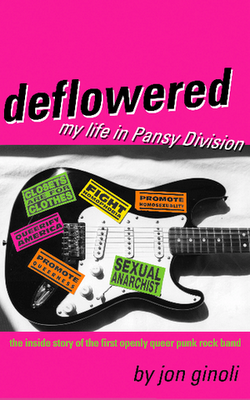Deflowered: My Life in Pansy Division

As I was reading Jon Ginoli's retelling of the rise of pop punk's first openly gay band, Pansy Division―from his perspective as the lead singer―I found that whenever I left the book on the table, with its bright pink cover labeled with stickers reading “promote homosexuality” and “sexual anarchist,” I could only imagine there were a few raised eyebrows in the small town Northeast Ohio coffee shop where I read. And I can imagine that these raised eyebrows and perked ears listening to the unabashedly queer lyrics―something they were most likely not accustomed to―was one goal. It is hard to be ignorant and hateful in the face of authenticity and irreverence. It is hard to resist the fearless and ribald celebration of being a member of a minority forced for so long to cower on the margins of a supposedly free and egalitarian society. This is what I suspect is the enduring legacy of this band that “came from a somewhere” in the middle of America.
But let's be clear. Pansy Division did not simply trail-blaze through punk rock as the first openly gay pop punk band. It was also a group of friends and the harrowing tales of the varied reactions and accommodations to Pandy Division through the US and Canada; it was as good a read as Ginoli's portrayal of his activity with ACT UP and the homogeneity of the gay club scene. Ginoli's Deflowered is as much a story about the love of independent music as it is of a band with lyrics that combine humor and relatability in a way that many gay and straight listeners to punk and rock could only speculate concerning other well-known acts.
By the time I had reached the last page, my iPod had several Pansy Division songs, specifically “Bunnies” and “The Cocksucker Club.” It seemed an appropriate way to support and celebrate their time on stage.